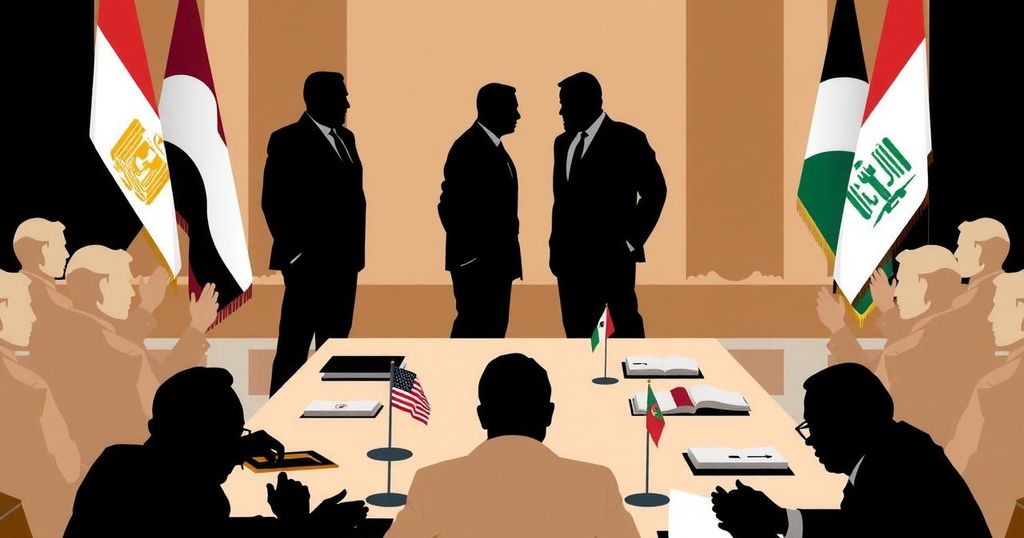Egypt, Jordan, Iraq Call for International Action Against Israeli Actions in Lebanon and Gaza

The foreign ministers of Egypt, Jordan, and Iraq condemned Israeli actions in Gaza and Lebanon, urging for international intervention amid rising tensions. Their meeting, held during the United Nations General Assembly, highlighted concerns over civilian casualties and the risk of regional war due to ongoing military operations. Meanwhile, Lebanon faces severe humanitarian distress as Israeli airstrikes continue against Hezbollah, resulting in numerous civilian casualties.
The foreign ministers of Egypt, Jordan, and Iraq convened to deliver a unified denunciation of Israel’s military actions in both Gaza and Lebanon, urging for international intervention to mitigate the escalating violence in the region. This meeting occurred on the sidelines of the 79th session of the United Nations General Assembly in New York, where the ministers also evaluated regional cooperation and strategized for an impending trilateral summit in Cairo. In their joint declaration, they emphasized that the cessation of hostilities must commence with an immediate end to Israeli aggressions in Gaza and voiced their concerns over actions in Lebanon, warning that these could lead to a broader war. The ministers outlined the urgent need for a global communal response, particularly advocating for the involvement of the United Nations Security Council to curtail what they termed as Israel’s detrimental policies affecting regional stability. Meanwhile, the situation in Lebanon deteriorated significantly, with the country’s health minister describing the violence as “carnage.” Reports indicated that hospitals were overwhelmed with casualties from sustained Israeli airstrikes targeting Hezbollah, with approximately 550 individuals reported dead in the latest wave of violence, many of whom were civilians. The Israeli military, for its part, asserted that its operations were against numerous Hezbollah positions implicated in hiding arms among civilian neighborhoods. Hostilities escalated further, with Hezbollah retaliating against Israel by launching rockets, including what was described as a long-range projectile that triggered air raid alarms throughout central Israel. Despite these counteractions from Hezbollah, reports suggested that the group continued to adapt and utilize its substantial military resources effectively against Israeli strikes. While neither Israel nor Hezbollah demonstrated an inclination to de-escalate the conflict, United States President Joe Biden spoke at the UN General Assembly advocating for a peaceful resolution to the crisis. Concurrently, UN Secretary-General António Guterres cautioned against allowing Lebanon to reach the dire state Gaza currently faces. Furthermore, recent Israeli airstrikes in Lebanon raised alarms, particularly following the tragic incident wherein a raid killed six family members, including young children, during an attack on the home of a deceased Hezbollah fighter. Human Rights Watch has since called for a comprehensive investigation into Israel’s airstrikes in Lebanon citing grave risks posed to numerous civilians under ongoing bombardment, with records indicating over a thousand such strikes since the conflict with Hezbollah escalated.
The recent actions in Lebanon and Gaza have drawn widespread international attention, particularly in light of the escalating military conflicts involving Israel and Hezbollah. The foreign ministers of Egypt, Jordan, and Iraq have highlighted the urgency for an international response to what they perceive as dangerous aggression by Israel, particularly towards civilian populations. The context of the current crisis includes a series of Israeli airstrikes targeting Hezbollah and a significant retaliatory response from the group. The involvement of these three Arab nations reflects a broader concern for regional stability.
In conclusion, the foreign ministers of Egypt, Jordan, and Iraq have articulated a robust condemnation of Israeli military operations in Gaza and Lebanon, calling for international action to address the rising hostilities. The grim situation in Lebanon, marked by significant casualties and the urgent need for humanitarian intervention, underscores the dire implications of this conflict. With both sides relentless in their military engagements, international diplomatic efforts remain crucial to avert an escalating crisis that threatens to engulf the region.
Original Source: www.dailynewsegypt.com








